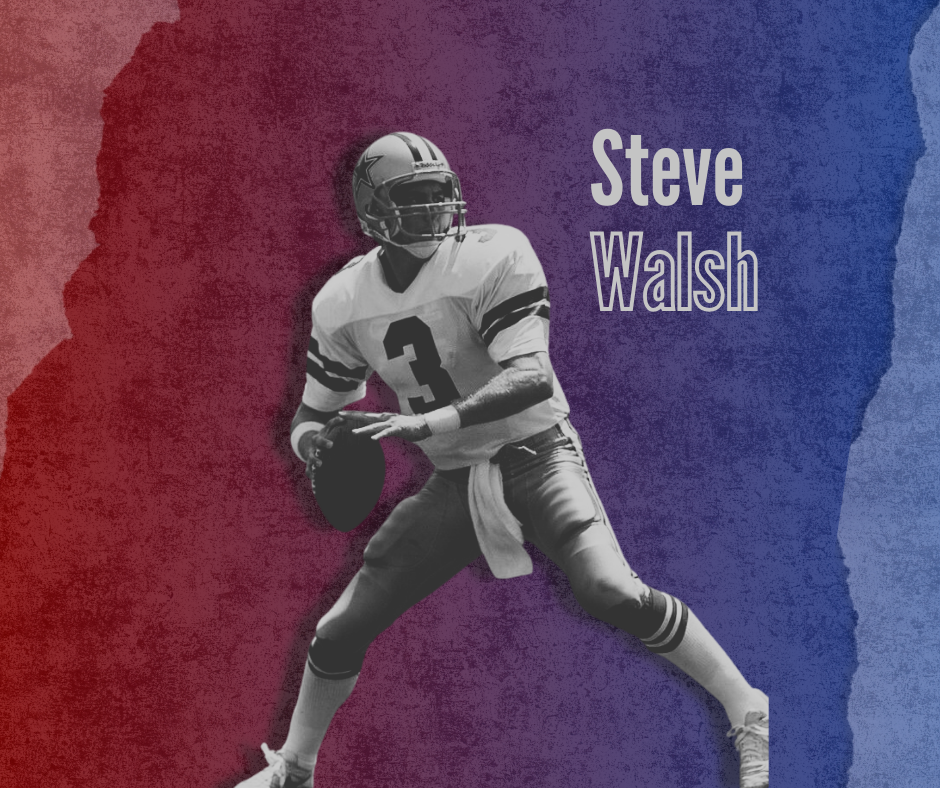If you’ve tuned into online sports debates recently, especially around quarterback rankings, you’ve seen how much context matters. Quarterbacks, NBA players, and even starting pitchers in baseball are judged not only by their talent but by the situations around them. Where a player lands can determine whether they’re remembered as a star or a disappointment. And no matter where you fall in the debate, most would agree that circumstances players cannot control often shape the course of their careers.
It is common to see this framed as a team-based hypothetical. Fans often ask, what if the Timberwolves had drafted Steph Curry, or what if the Trail Blazers had taken Michael Jordan? But the reverse is less often explored. What if a player found himself in circumstances so unusual, so bizarre, that his career never had a fair chance to succeed? For one player, that was reality. Despite being a first-round pick, quarterback Steve Walsh encountered two separate but equally strange situations that derailed his opportunity to establish himself as an NFL starter.
Walsh’s career became that of a supporting actor, a footnote in the stories of bigger names and larger forces that defined the league.
The Draft That Doomed Him
Walsh entered the NFL after a decorated career at the University of Miami, declaring early and forgoing his senior season. Because of that decision, he was not part of the 1989 regular draft, where UCLA quarterback Troy Aikman went first overall. Instead, Walsh landed in the supplemental draft. What happened next shocked both fans and columnists: the Dallas Cowboys used a first-round supplemental pick on Walsh.
It was perhaps the worst possible time to be a first-round quarterback drafted by Dallas. The team had just spent the first overall pick on Aikman months earlier, and now they had mortgaged their 1990 first-rounder to bring in another quarterback. The fallout was immediate and long-lasting. Roster construction was awkward, and the Cowboys had effectively given away one of the most valuable draft picks in franchise history.
Walsh did have support within the organization in the form of former Miami coach Jimmy Johnson. He started five games as a rookie in 1989, leading the team to its only win in a 1-15 season. Aikman, however, was always the chosen one, and by year’s end Walsh was clearly the backup. The Cowboys finished with the league’s worst record, a spot that normally would have netted them the first overall pick in 1990. But that selection had already been forfeited for Walsh, a quarterback who was already second on their depth chart.
That unlucky start placed Walsh in a nearly impossible situation. What he could not have known was that his next stop in the league would be shaped by another bizarre and historic set of circumstances, this time in New Orleans.
The Hebert Holdout
While Walsh was beginning his pro career in Dallas, the New Orleans Saints were dealing with their own quarterback turmoil. Starter Bobby Hebert had been benched in 1989 for backup John Fourcade. The following year, Hebert’s contract expired. Free agency as we know it did not yet exist, and Hebert refused to enter training camp without some form of security. The Saints front office, led by Jim Finks, took a hard-line stance. They were unwilling to pay a potential backup starter’s money, and they refused to trade him. The standoff escalated into a holdout that would last more than a full year.
With the regular season approaching and no clear resolution, Finks finally pivoted. He traded a package of draft picks (a first and third in 1991 and a second in 1992) to Dallas for Steve Walsh.
For Walsh, this looked like a long-awaited opportunity. He immediately stepped in, led the Saints to an 8-8 record, and even delivered a playoff berth. In doing so, he also kept the Cowboys, his former team, out of the postseason. It must have felt like he had finally secured his place in the league.
But once again, circumstances intervened. The Saints’ offensive output was uninspiring, and Hebert remained in the picture. After a grueling 18-month holdout, Hebert signed a new contract covering 1991 and 1992. Just like that, Walsh was once again relegated to backup duty, this time behind a quarterback who had just won a major labor battle with the league.
The Larger Story
Hebert’s fight with the Saints was about more than one player’s salary. His holdout culminated in testimony in the landmark McNeil v. NFL case, which ultimately struck down the restrictive “Plan B” free agency system. The ruling paved the way for the creation of the modern free agency structure still in place today.
So while Walsh was demoted again, his teammate’s battle changed the sport. Once more, Walsh had been caught in the middle of NFL history, serving as a supporting figure in a story much bigger than himself.
A Glimpse of Starting Glory
Walsh would eventually benefit from the free agency system Hebert helped create. In 1994, he signed with the Chicago Bears as an unrestricted free agent. When starting quarterback Erik Kramer went down with an injury, Walsh finally had another chance to prove himself.
He made the most of it, going 8-3 as a starter and leading Chicago to a playoff win over division rival Minnesota. For a brief moment, it seemed like Walsh had carved out a real role. But when Kramer returned the next year, Walsh was once again pushed aside.
From there, he became a journeyman, backing up names like Trent Dilfer and Peyton Manning. He played 10 seasons in the league and started 38 games, but he never shed the label of a career backup.
The Legacy of Circumstance
Looking back, it feels as if fate conspired against Steve Walsh at every turn. Drafted in the wrong year by the wrong team, sacrificed as collateral in a labor standoff, and overshadowed by stars and systems beyond his control, he never truly had the chance to be a franchise quarterback.
Yet his story still matters. The Cowboys’ gamble shaped the early years of Jimmy Johnson’s dynasty. The Saints’ trade and Hebert’s standoff directly contributed to the rise of modern NFL free agency. And Walsh, through no choice of his own, became a thread running through both.
If you subscribe to the Great Man theory of history, you have to believe there are also figures like Walsh: players who are remembered not for what they achieved but for the larger movements they were caught up in. Walsh’s career may be remembered as a series of “what-ifs,” but it also serves as a reminder of how much the NFL has changed, and how often players’ fates are decided by forces outside their control.
Steve Walsh never became the star his draft pedigree suggested, but in his own way, he was part of some of the most important shifts the league has ever seen.
Want more Sandman? Come connect with us here at sandmansports.com/onestopshop





